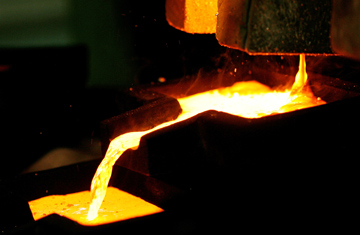
Mixed gold and silver are poured into ingot molds at a furnace facility
Magdalena Gómez knows the solution to her hometown's suffering. Like roughly 20% of the adult population in Tapia de Casariego, the 27-year-old mother of two is unemployed. She has seen many of her neighbors, desperate for work, move away from this corner of northwestern Spain in search of opportunities in bigger cities. Which is why, even though she knows that a sizeable portion of Tapia is opposed to it, Gómez supports the construction of a new mine. "We don't have anything else here," she says. "We need that gold."
There's a gold rush under way in northwestern Spain, and Tapia is just one of the places trying to figure out what to do about it. With gold prices skyrocketing, deposits that have lain untouched for decades, if not centuries, are suddenly looking awfully appealing to international mining companies. And with the Spanish economy in profound crisis, the jobs that those companies promise — even if they're not permanent — are looking just as irresistible. But as the controversy dividing the town of Tapia suggests, not everyone is convinced that the benefits are worth the risks.
Since Roman times, Asturias and Galicia have been known to contain significant ore deposits — in fact, mines from those regions provided much of the empire's gold. Yet the technical difficulties of reaching the mineral, coupled with the European Union's strict environmental regulations, had long dissuaded mining companies from extracting the precious metal. But that all changed about two years ago when three different Canadian companies started buying up prospecting rights.
"The biggest impediment was always the price of gold," says George Salamis, CEO of the Vancouver-based Edgewater Exploration, which acquired rights to three concessions of nearly 2,000 acres (810 hectares) in Corcoesto, Galicia, in 2010. "When gold was at $400 an ounce, it wasn't economically feasible to go in there. But now it's at $1600 an ounce." And when his company discovered that the deposits were much greater than expected — they now predict that it holds 1.5 million oz. — it only increased their enthusiasm.
But the new interest doesn't go in only one direction. According to Salamis, the crisis has also made the Spanish government more receptive to mining. "During the boom times, there wasn't much interest, because they had other economic options. But now Spain, and Europe in general, are seeing a way to dig themselves out of their economic woes by developing their mineral resources."
Part of that digging consists of creating new jobs in a country plagued with the highest unemployment rate in the euro zone. "When we held court with the mayor and the local citizens, the thing they kept saying to us was, 'When is Edgewater going to get serious? We need these jobs now,'" says Salamis.
